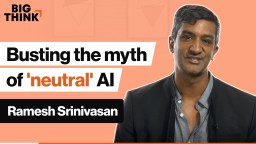Elad Gil: So one of the things that worries me the most in the technology world today is the degree to which the external world has viewed technology with more and more cynicism and the degree to which there's a little bit of a backlash starting. And I think that there's a few drivers for that here. I think the recent elections is sort of one example where people feel they were manipulated I should say by third parties abusing technology. And I think separate from that there's also just these sort of media waves where media tends to go in cycles where the press will build something up and then tear it down and then build something up and tear it down. And I think technology was really built up in the media for a 20-year period or so, and now it's sort of a time of reckoning to some extent.
I think that's very unfortunate because I believe that optimism is a reflexive asset in sort of the George Soros' view of the world where something that people give value to gains value by that belief in the value of that thing. And if you actually look at the major changes that have happened in the world it's because people have been extremely optimistic in ways that some folks thought was irrational, but that optimism allowed them to actually accomplish that giant goal.
I mean think of putting somebody on the moon and what we were able to accomplish in the '60s, or think about a variety of other examples like that the Manhattan Project or major breakthroughs have all sort of come through an enormous sense of optimism and "we can do this." Manifest destiny and sort of the development of the United States as a country is a good example of that on the sort of country and governance level.
And so one thing that I've seen more and more increasingly is an increase in cynicism and people being made fun of. The first thing they want to change the world and they're genuine about it and I think that's a very big negative. And so one of the things that I've been thinking a lot about recently is: how can you actually increase societal optimism?
What are the mechanisms by which people can become more enthusiastic about their future and more enthusiastic about technology? Because if you look at the changes that technology has rote over the last 20/30 years it literally has lifted tens or hundreds of millions of people out of poverty. It has created access to global markets and it has created access to global information. Everybody is walking around with literally a super computer in their pocket that gives them access to the sum of all of humanity's knowledge with maybe the exception of the scientific journals, which are still blind. So I do think that people should be incredibly optimistic about the future and one thing I wonder about is how can you help spread that optimism? Because I think if people believe they can do something they often achieve things that they never thought was possible.
So, a lot of people have recently had a lot of very cogent concerns around the rise of misinformation and disinformation on social media platforms and how that impacted our last election. And I think those are very legitimate concerns and I think some of the platforms have made pretty major mistakes in terms of how they've approached some of those things. It's interesting though, because if you look at it over the arc of history this is not a new story. Every time that there's a new technology, particularly around media, there's a set of outcries around how that media is corrupting culture or how it's destroying certain aspects of our life, and in some cases those are real concerns. There's a great book from Tom Standage about the early telegraph in the 1800s called The Victorian Internet and he basically makes the argument that a lot of the behavior that exists online today was being done by telegraph operators in the 1800s because they were just sitting on these lines talking with each other over Morse Code, and they would gossip and they would trade recipes and they would date, but also it was a way for news to spread quickly. And a lot of people argued that it was a downfall of a variety of things. It could be the downfall of markets because suddenly markets were more efficient or it could impact religion or other things. And then we had radio. Actually before radio we had to newspapers in the early 1900s, and there was the wave of yellow journalism, there's a Spanish American War that was caused by a new form of media. And then we had a radio, and radio was "corrupting youth" by spreading rock 'n' roll and sin and all sorts of bad things. And then we had TV, which was turning everybody into vegetables. And then we had video games, which was turning all of our children into killers. And now we have social media as the next new media platform, and Instagram is destroying our youth. And I think that fact about Instagram is true—I'm joking about that. But in the broader context if you think about it every time we have a new form of media we make the argument that that form of media is the thing that's going to destroy our society, that's correcting our politics, that's corrupting our children, that's destroying our ability to think for ourselves and every time society has turned out okay. Now that doesn't mean that social media platforms shouldn't be reacting or shouldn't be addressing these issues, I'm just saying if you look at it through the larger lens of history this is not a new story.





